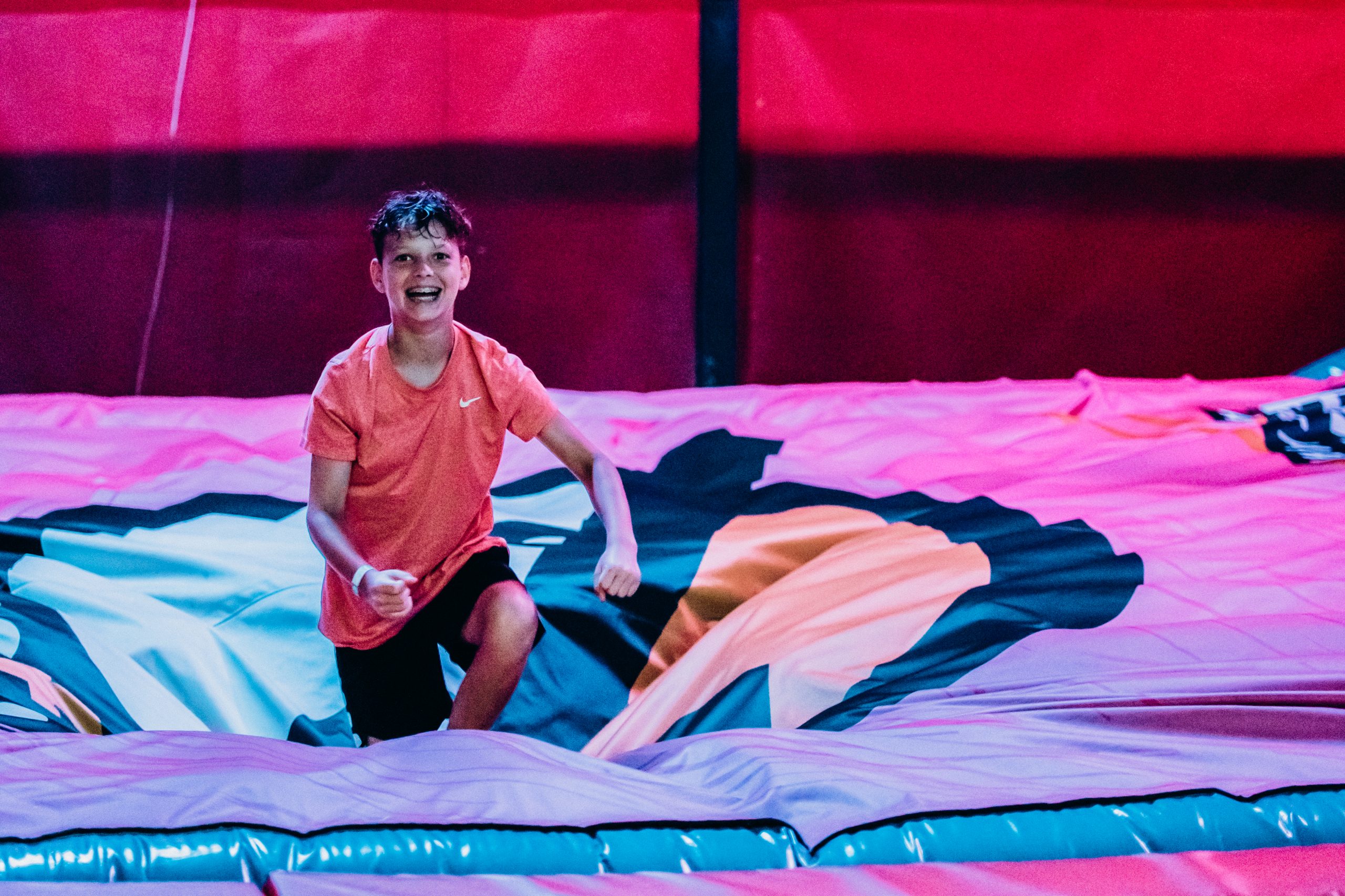
‘Imagine a world where … ’: Urban Air Adventure Park is inventing new ways to play
Michael Browning Jr. smiled at his little world of joy.
The amusement park he’d conceived was coming to life. He’d placed a roller coaster here, some bumper cars there and, in the middle, a café to dish up slices of pizza. Browning could even hear his “guests” squeal with delight.
Once upon a time, that whole, happy scene existed only on a young boy’s computer screen, all part of a simulation game called Rollercoaster Tycoon that had stirred Browning’s imagination. To keep his digital patrons happy, his virtual rides had to be thrilling, his snacks plentiful, his lines short.
He never lost that craving to create fun.
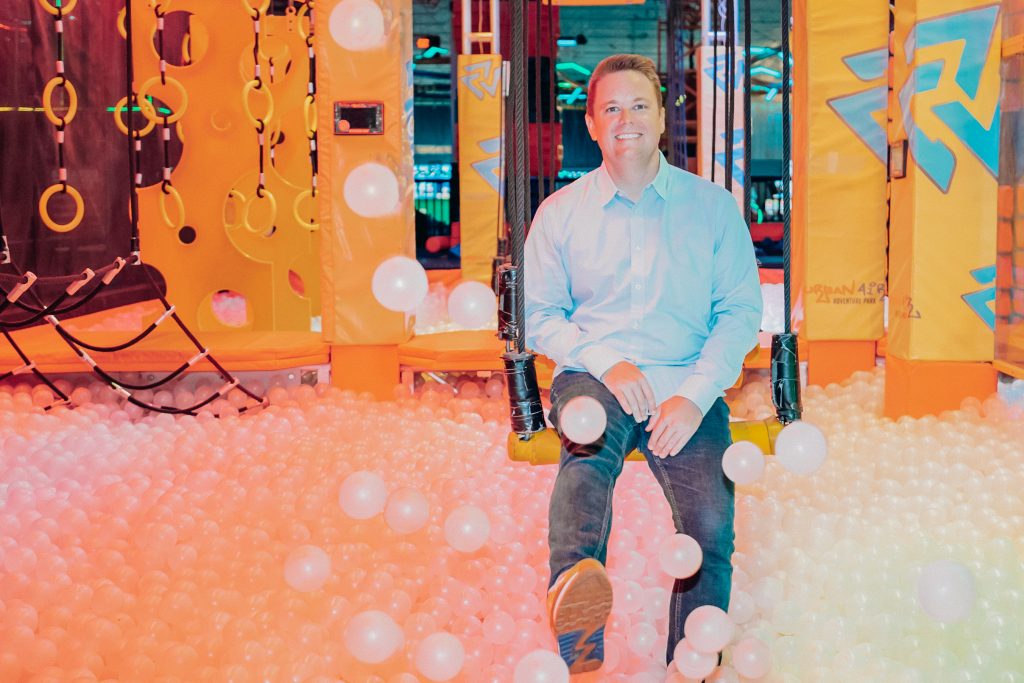
Michael Browning Jr. at an Urban Air Adventure Park in the Dallas area.
Today, Browning has built something quite real and way bigger – a thriving national network of indoor play spaces featuring sky coasters, battle beams, wipeout bars and “immersive reality arenas.”
Welcome to Urban Air Adventure Park, which spans 154 franchises across the U.S. and offers kids the exact type of glee-soaked place that, 20-some years ago, Browning repeatedly produced on his childhood PC in his Texas bedroom. Ironically, the top purpose of Browning’s modern parks is to convince children to momentarily abandon their screens.
“That’s the reason why we get out of bed every day, to help families celebrate special moments, escape the hardships of the real world and connect socially – offline,” says Browning, chief executive officer and founder of Urban Air Adventure Park.
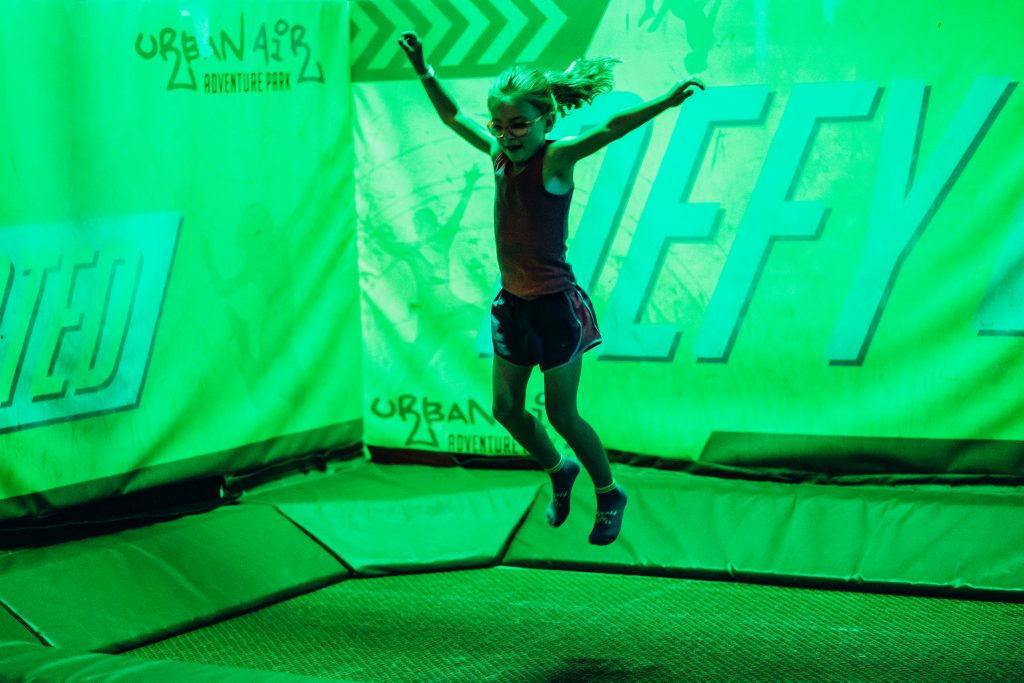
Leighton Browning of Keller, Texas grabs some big air.
“After the COVID-19 isolations, that purpose is even bigger,” he adds. “Many people have realized that humans are designed for relationships and interaction. People are longing for those. They’re looking for physical interaction, for suspense, to laugh and smile, to accomplish something in the physical world.”
The pandemic forced Urban Air to temporarily shutter all its parks in March 2020. Immediately, Browning – along with the company’s chief technology officer, Peter Karaganis, and the engineering team – began retooling Urban Air’s e-commerce platform to prepare for an eventual re-opening.
“We knew we would need to provide a method for people to visit the parks in a safe manner that would allow social distancing and meet the requirements of local and federal health agencies,” Karaganis says.
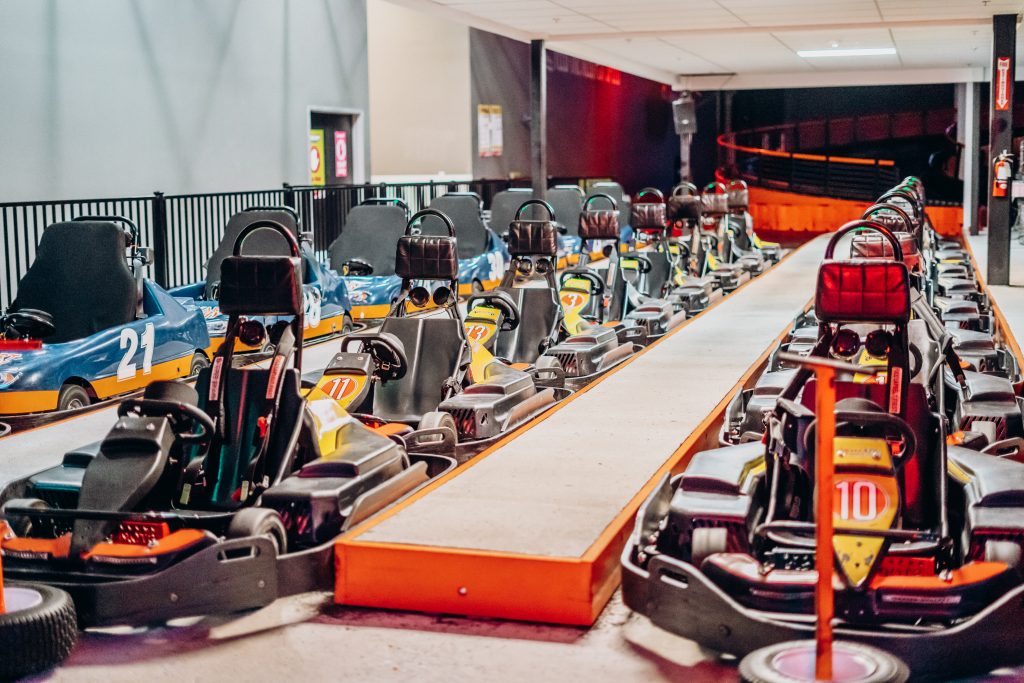
Bumper cars sit parked and ready. Early in the pandemic, Urban Air temporarily closed all locations.
The e-commerce platform, hosted on Microsoft Azure, originally sold only park memberships. Utilizing Azure’s flexibility and scalability, the team added a ticket-reservation system that now allows guests to choose the date and time of their visit, whether they’re buying individual passes or already own a membership.
As a result, each franchise can ensure their park never exceeds COVID-19 capacities as defined by local health officials.
The new platform also sells merchandise like Urban Air-branded socks, plus goodies like cotton candy, ice cream and pizza, Karaganis says.
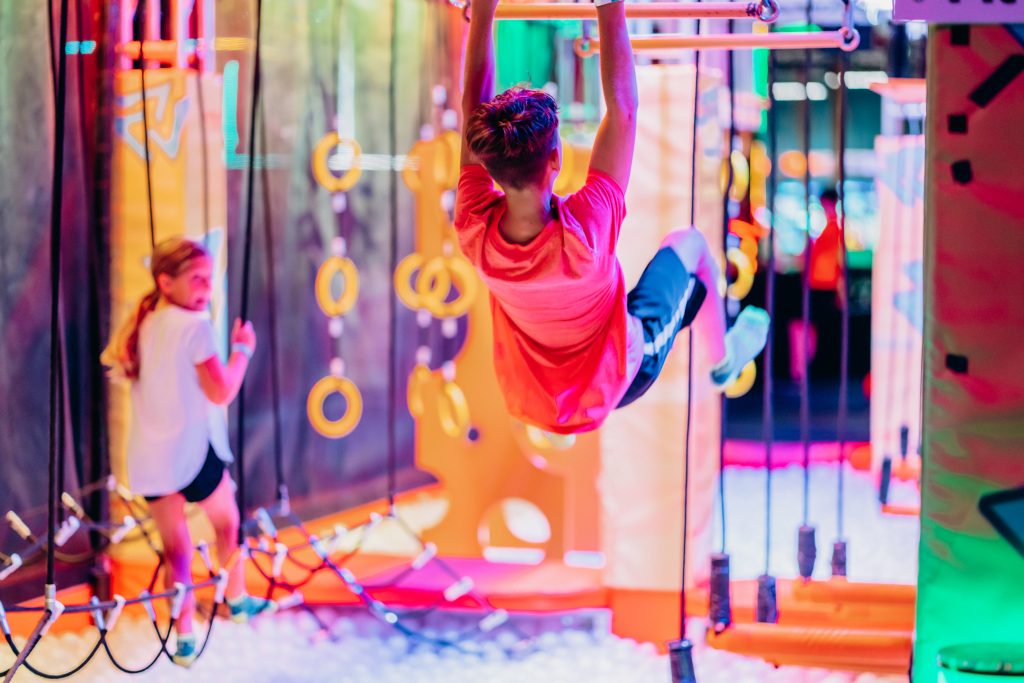
Graham Kaler of Keller, Texas swings his way through a climbing course.
As COVID-19 restrictions eased earlier this summer in many areas, Urban Air introduced a concept called “all day play.” Guests still must make reservations. But data churned out by the cloud-based, e-commerce platform is helping franchise managers make more precise staffing decisions. This reduces costs and helps prevent lobby waits for arriving families.
And they are arriving in droves. Average sales across the franchises are up 28 percent when compared to pre-COVID-19 levels.
Riding that growth, 81 new Urban Air franchises are set to open in 2021 and 2022, Browning says. All that has bloomed from a modest, four-location launch 10 years ago in the Dallas-Fort Worth area. It began as a family business. Browning teamed with his dad, mom and wife to run the parks.
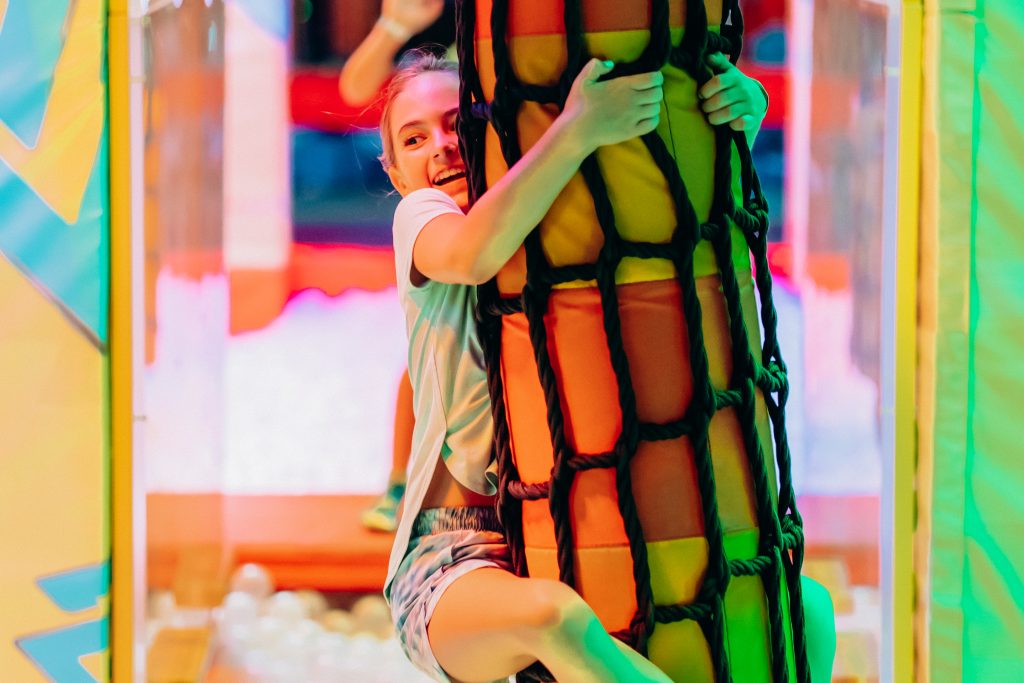
Landree Browning of Keller, Texas hangs on while attacking the warrior course.
This year, the company projects it will welcome more than 20 million kids. Data from those visits is analyzed by Microsoft Power BI, allowing the executives to “better understand the question: Who is the user of Urban Air?” Browning says.
“We know mom is the customer, the kid is the user and that 77% of our users are between the ages of 6 and 12,” Browning says.
If it sounds like Browning lives and breathes data, well, now you’re getting the picture.
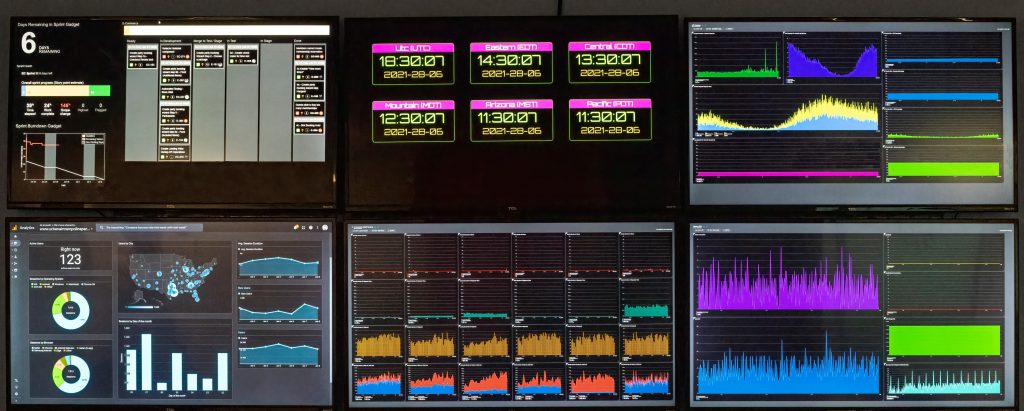
Power BI dashboards at company headquarters offer a visual depiction of data from all 154 franchises. (Courtesy Urban Air)
The young entrepreneur – named a 2021 “40 under 40” rising star by the Dallas Business Journal – began his infatuation with data while attending Texas Christian University. He earned degrees in finance and political science, and he launched a data analytics company from his dorm room. He later sold that startup.
Browning often talks as much about dwell time and wallet share as he does about the raw excitement he sees in the faces of kids who sample Urban Air’s virtual snowball fights and slam dunk zones.
Case in point: That Power BI finding that most park users are ages 6 through 12. To expand their franchise base, company leaders have searched the data to spot communities with suitable real estate locations that sit a short drive away from pockets of those potential users, Browning says.

Michael Browning Jr.
That piece of data analysis held true on a recent weekday at the Urban Air Adventure Park in Raleigh, North Carolina. Located in an outdoor shopping mall next to an arts and crafts store, the franchise teemed at 2 p.m. with moms and young kids – some harnessed into a zipline near the ceiling, others steering their bumper cars and looking for other drivers to smash.
The big room’s booming soundtrack was a mix of happy howls and bumper car music, offering the vibe of a county fair 2.0, but all housed under one roof.
Best friends Ava Seltzer and Alyssa Coe, both 9, were there on a playdate. Alyssa was drawn to the zipline (called the Sky Rider) – “I like to fly,” she said. Ava was partial to the “warrior obstacle course,” which offers a spongy landing if gravity takes hold – “When you fall, it doesn’t hurt,” she said.
“I like it because it’s really clean, very spacious and the air in here is circulating well,” said Ava’s mom, Colleen Seltzer, who lives in Raleigh.
“As a mom, and with everything happening with COVID, it makes me feel good to be in a clean environment,” Seltzer added.
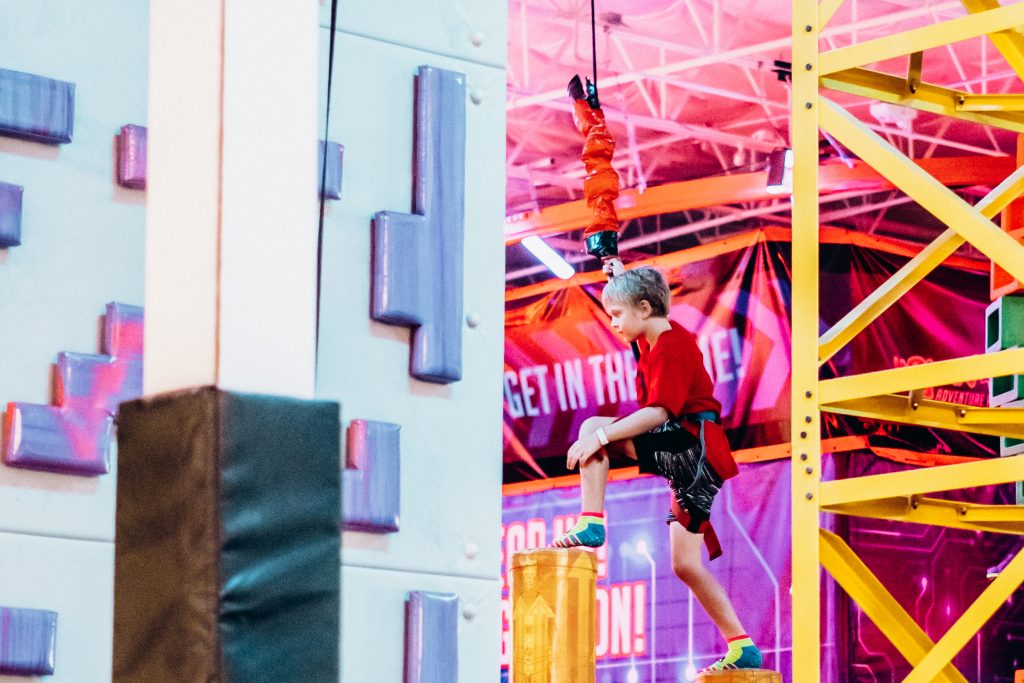
Lucas Ulanowski of Hurst, Texas is all focus during his climb.
In the café, 10-year-old Landon Carroll was munching lunch with his mom, Melissa Carroll. They were enjoying one of their designated “mommy-and-son days” that the pair sets aside “just to go somewhere and hang out,” Landon said. They live in Roxboro, North Carolina, an hour north of Raleigh.
“It’s just fun. I can get my mom to do things she’ll never do. Like that!” Landon said, pointing with a grin to the Sky Rider.
Early on, trampolines were the parks’ main feature. No longer. The data showed Browning that when play facilities are built around single attractions like trampolines, guest frequency and spending rates decline as the product gets stale.
In 2017, the company removed about 80 percent of its trampoline footprint and installed fresher games, such as the “warrior obstacle course.” Browning spotted some of those attractions during his global travels to scout new ideas.

Landree Browning lands safely in a large vat of plastic balls.
In rare cases, he and his engineering team have invented attractions, like Urban Air’s “immersive reality arena.” The 2,000-square-foot space contains floors and walls ablaze with projection mapping – where video projectors stream light onto common surfaces to form interactive displays.
The arenas are also equipped with theatrical sound, laser-based radar and Microsoft Kinect, which uses artificial intelligence sensors and computer vision.
“Imagine a world,” Browning says, “where you step through a door and enter a room that reacts to everything you do. You step into the game wearing no gear – no lenses, no headsets. It’s unbelievable.”

A cafe table inside a park in the Dallas area.
That idea splashed into Browning’s head one evening as he and his kids watched the movie “Ralph Breaks the Internet,” about a videogame villain who travels inside the internet to fix his friend’s video game.
“Our arena allows the guests to roam freely, non-tethered, with no headsets, to play and interact with each other. We’re putting them inside the game where they can laugh but also experience it with others around them. That’s the future of Urban Air,” Browning says.
“When we look at what’s next, we go back to the data. It’s got to fit our demo. It’s got to be safe. It’s got to be active. It’s got to be unique,” he adds. “And it’s got to have a repeatability so it’s not a one-and-done experience for the kids.”
When you think about it, that sounds a whole lot like a guy who’s been dreaming up small adventures since he, himself, was a kid, tapping into his computer and listening only to his imagination.
Top photo: Graham Kaler lands gleefully on a giant mat. (All photos – except the image of the Power BI screens – by Bordeau Photo)

